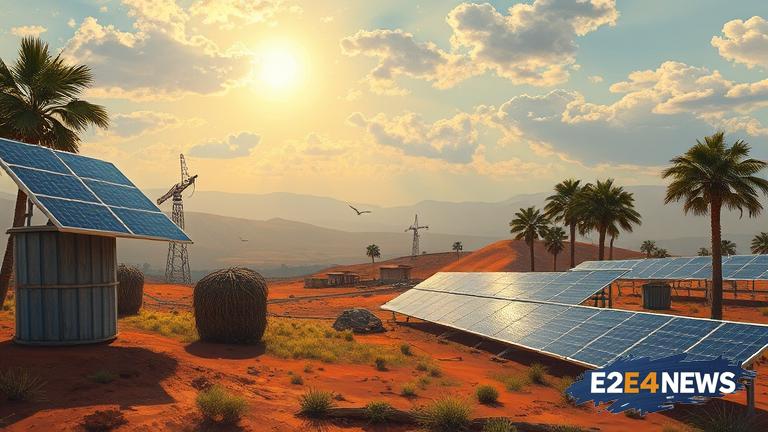Africa, a continent with an abundance of sunlight, is on the verge of a solar energy boom. With many countries struggling to meet their energy demands, solar power is becoming an increasingly attractive option. The cost of solar panels has decreased dramatically over the years, making it more accessible to African nations. Additionally, the continent’s vast desert landscapes provide ideal conditions for large-scale solar farms. As a result, many African countries are investing heavily in solar energy infrastructure, with some aiming to generate up to 50% of their electricity from solar power. Morocco, for example, has set ambitious targets to become a major solar power hub, with plans to generate 52% of its electricity from renewable sources by 2030. Other countries, such as South Africa and Egypt, are also making significant strides in solar energy adoption. The African Union has set a target of generating 300 gigawatts of renewable energy by 2030, with solar power expected to play a major role in achieving this goal. However, despite the potential, there are still significant challenges to overcome, including lack of infrastructure, financing, and regulatory frameworks. Many African countries also face significant energy access gaps, with millions of people lacking access to reliable and affordable energy. Solar energy can help bridge this gap, particularly in rural areas where traditional grid extension is often not feasible. Furthermore, solar energy can also help reduce greenhouse gas emissions and mitigate climate change, which is a major concern for many African countries. The International Renewable Energy Agency (IRENA) has estimated that Africa could reduce its carbon emissions by up to 70% by transitioning to renewable energy sources. To achieve this, many African countries are exploring innovative financing models, such as pay-as-you-go solar home systems, to make solar energy more accessible to low-income households. Moreover, there is a growing recognition of the importance of energy storage in unlocking the full potential of solar energy in Africa. As the cost of energy storage technologies continues to decline, it is expected that many African countries will invest in large-scale energy storage systems to stabilize their grids and ensure a reliable supply of electricity. In conclusion, Africa is on the cusp of a solar energy revolution, driven by declining costs, increasing demand, and a growing recognition of the importance of renewable energy. While there are still significant challenges to overcome, the potential for solar energy to transform the continent’s energy landscape is vast. With the right policies, financing, and infrastructure in place, Africa can unlock the full potential of solar energy and achieve a sustainable, low-carbon future. The benefits of solar energy are numerous, including reduced greenhouse gas emissions, improved energy access, and enhanced energy security. As the continent continues to grow and develop, it is likely that solar energy will play an increasingly important role in meeting its energy needs. In fact, many experts believe that solar energy could become the dominant source of energy in Africa within the next few decades. This would not only help reduce the continent’s reliance on fossil fuels but also create new economic opportunities and jobs in the renewable energy sector. Overall, the future of solar energy in Africa looks bright, with many countries poised to make significant strides in the coming years. As the continent continues to transition towards a low-carbon economy, it is likely that solar energy will play a major role in shaping its energy future. With its vast solar resources and growing demand for energy, Africa is well-positioned to become a global leader in solar energy adoption. The potential for solar energy to drive economic growth, improve energy access, and reduce poverty is vast, and it is likely that many African countries will prioritize solar energy development in the coming years. In addition to the economic benefits, solar energy can also help improve health outcomes by reducing air pollution from fossil fuels. Furthermore, solar energy can also help enhance energy security by reducing reliance on imported fuels. As the continent continues to develop and grow, it is likely that solar energy will become an increasingly important part of its energy mix. In fact, many experts believe that solar energy could become the primary source of energy in Africa within the next few decades. This would not only help reduce the continent’s carbon footprint but also create new economic opportunities and jobs in the renewable energy sector. The growth of the solar energy sector in Africa is also expected to attract significant investment and create new opportunities for entrepreneurship and innovation. As the continent continues to transition towards a low-carbon economy, it is likely that solar energy will play a major role in shaping its energy future. With its vast solar resources and growing demand for energy, Africa is well-positioned to become a global leader in solar energy adoption.
Mon. Oct 20th, 2025
